All of you would agree if I said each one of us has a food memory that reminds us of some beautiful times and people in our lives. The Tuver Na Thotha Ne Dhokli is one such humble dish that takes me back to my school days and ushers a million memories…
OH those summers of once upon a time…they were so beautiful back then, the lazy afternoons and cool breezy evenings, the musky aroma of the soil that had been generously watered after having baked for the entire day, the plants and trees drenched and cooled after their evening bath, the resultant puddles and slushy patches that made ideal play hubs for all us kids. Moulding toys from the mud, building temples and houses with gardens and large compounds, plucking the leaves and flowers from our garden to decorate the mud structures we had just created, every evening we did the same thing and yet we never got bored of it and evenings just flew by. Back in the seventies, we hardly had such easy access to toys, the ones available had to be shared with all or we made our own toys and making toys out of clay was the most enjoyable activity. Moulding the wet and gooey mud to create stuff and creatures we saw around us and later play with them was something we looked forward to during summer evenings. A couple of calls from mummy to get us back into the house made us rush to the wash area in the compound, clean ourselves of all the grime and directly head over to the terrace to make beds so as to give them enough time to cool down before we arrived for our good-night sleep. By night the air around our home would be plump with the rich and soothing fragrances of the neem, fry-wood, copper-pod and juhi flowers. Looking at the way things are now, I feel blessed to have grown up in a home the had 7 huge neem trees and numerous varieties of juhi vines. The slumber would come to an abrupt end with the koel made its presence on the neem trees and let out her shrill songs before the sun peaked out while thousands of noisy parakeets flocked in unceasing rows over the early morning sky marching from their roosts to feeding grounds. The dew drenched beds by early morning were so wet that it made us believe it rained during the night. By 6.15 in the morning the sun would be up and about pushing us to get out of the beds while we kept tucking ourselves under the razai all in the hope to steal that 10-15 minutes more of our slumber from the rapidly rising day. Ahhh…. such magical were those times!!!
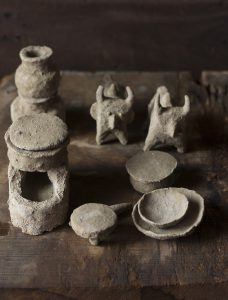
Summers were also special because we got to spend our summer holidays with our Nani-Nana and our cousins, Mamas and Mamis. Extremely beautiful, absolutely charming, tall, gracious and graceful my Nani, was blessed with dexterous skills. Her kitchen was the most charming and happening place in the entire household. I have very vivid memories of coal fuelled chulas lit very early in the morning, the sight of smoke from these sighri escaping from filigree walls a we could see in the the early morning rays, the household helps working on the silbatta (rolling stone) to prepare fresh masala pastes and chutneys, Nani or Ba as we called seating on her special seat with her paan-dan while she oversaw the daily schedule, every summer when all of us got-together it would be 30-35 of us and hence the kitchen would be always bustling with activity. If we ran out of activities we would ram into the kitchen hungry most of the times….there were 13 of us kids so even if half of us came into the kitchen it would be a task so to keep us all busy, so Ba assigned us some tasks one of which was to roll and shape the Dhokli (Gujarati style pasta) that were to be added into the Tuver Na Baakra (whole pigeon peas are called so). It was a hearty dish, a one pot means that was convenient to feed the gathering 🙂 We would come up with shapes, figures and animals of our choice, Ba would also make some and sneak a coin in the Dhokli promising a reward to person who got the coin-wali dhokli…that was her way to ensure we ate well, had fun while cooking and connected to the food we ate. The hope of getting a reward made sure we ate properly so that we aren’t hungry in next one hour…
Back then no TV or gaming gadgets meant we spent lot of time outdoors roughing it out with whole lot of playmates or listening to stories our Ba told. While summer and other holidays were spent with Nani the rest of the year passed in warm care of our Dadi. My Dadi too had her own unique way of keeping us kids busy while our Mums attended the chores. One of the task that she was responsible for was chopping and cutting the veggies. So while she chopped, she made us pluck and pod the greens etc. along with narrating to us stories of ghosts or Phanchtantra or might and velour. She also had this interesting tricks of creating creatures from the raw veggies she chopped. So a long brinjal would become a swan and the tindora became sheep and she never stopped sharing events related to animals she made or talk about phrases and stories associated with it……
The recipe I share with you today is very rustic and earthy dish that makes a very wholesome meal. Tuver or the pigeon pea is widely used pulse in Gujarat. I particularly like to snack upon the boiled, salted and lightly spiced dried tuver or prepare a chaat like salad to much on..During winters, when the fresh tuver is in season it features on the menu everyday, while in monsoon or summers when veggies are scarce the Tuver na thotha (made with tuver pulse) along with Bajra or Jowar Rotla (millet flat bread) is regularly made. This dish featured regularly in my Nani’s kitchen where she teamed it up with Dhokli and rice. There is no special recipe for Tuver Na Thotha and each household prepares it differently. The recipe featured here is how it was made by my Nani.
Sadly though not many families make this dish anymore, instead I have witnessed an emerging scenario where farm-house parties are hosted specially to enjoy Tuver Na Thotha and Rotla!!! Well its a regular food that is made exotic these days because most of us have forgotten about the humble origins of Tuver Na Thotha.. ……
Feel free to alter the spices to suit your taste with this particular recipe of Tuver Na Thotha Ne Dhokli, ….
Tuver Na Thotha Ne Dhokli
Server 2
Soaking time 8 hours
Cooking time 30-35 minutes
You’ll need pressure cooker, big mixing bowl and rolling stone and rolling pin
Ingredients
For the Tuver Na Thotha
- ¾ cup dried tuver/pigeon peas
- 1 medium onion, pureed
- 2 medium tomatoes, pureed
- 4 cloves garlic, paste
- 2 teaspoons ginger-chili paste
- ½ teaspoon turmeric powder
- 2 teaspoons dhana-jeera powder/coriander and cumin powder
- 1 teaspoon red chili powder
- ½ teaspoon rai/ mustard seeds
- a pinch of hing/ asafetida
- 1 tablespoon oil
- salt to taste
For the Dhokli
- ¾ cup whole wheat flour/atta
- 2 tablespoons besan
- ½ teaspoon turmeric powder
- ½ teaspoon chili powder
- a pinch of ajwain/carom seeds
- a pinch of sesame seeds
- salt to taste
- 1 tablespoon oil
- water to knead the dough
Method
- Begin by washing and soaking the tuver for 7-8 hours or overnight.
Dhokli Dough
- In a large bowl or parat, mix all the ingredients except water listed under the Dhokli ingredients and knead to a semi-stiff dough. The dough should to be neither too hard nor too soft.
- Cover the dough and give it a rest for 10-15 minutes.
To Cook Tuver Na Thota
- Drain the soaked tuver and transfer it to a pressure cooker add 2 cups of water and cook for 2 whistles. Turn off the flame and allow the pressure to escape before opening the cooker.
- Simultaneously, in a Kadai heat the oil.
- Once the oil is hot add rai, hing and pureed onion. Cook for a minute and add ginger+chili+garlic paste. Cook for another minute and add the pureed tomatoes.
- Cook the mixture until you find it releasing the oil. Should take around 5 minutes.
- Now add the turmeric, chili, coriander-cumin powder and salt. Cook the masala for a minute and add the cooked tuver along with the water it was cooked in.
- Give it a good mix and turn the flame to a medium. The mixture should come to a boil as you begin to add the dhokli so they begin to cook immediately.
- So by the time you finish rolling the Dhokli the Tuver Na Thotha mixture should come to a boil.
- Now divide the Dhokli dough into golf ball sized portions.
- Begin to roll the Dhokli, if you need take some flour to aid the rolling process. Roll each portion into 8” or 9” roti and cut it into multiple squares or diamonds with the help of pizza cutter or knife. These small squares are called dhokli. You may also shape them into desired shapes.
- As you finish cutting the dhokli , drop the Dhokli into the boiling tuver mixture and once all the dhokli are dropped give it a gentle mix , add a cup or so of more water and transfer it to the pressure cooker. Pressure cook the tuver thotha+dhokli for 2 whistles and turn of the flame.
- After the pressure has released open and check the consistency. The mixture has to be thick and creamy. The addition of dhokli will make the mixture creamy. If it is very thick add a little more water and adjust the consistency.
- Serve the Tuver Na Thotha piping hot with a drizzle of peanut or sesame seed oil.
- We first eat them as they are and later have it with some short-grained rice.
- At the end of the cook we also like to add some methia masala (gujarati achar masala). If you have it handy add it or skip the step. The Tuver Na Thotha taste just as good with out it ……

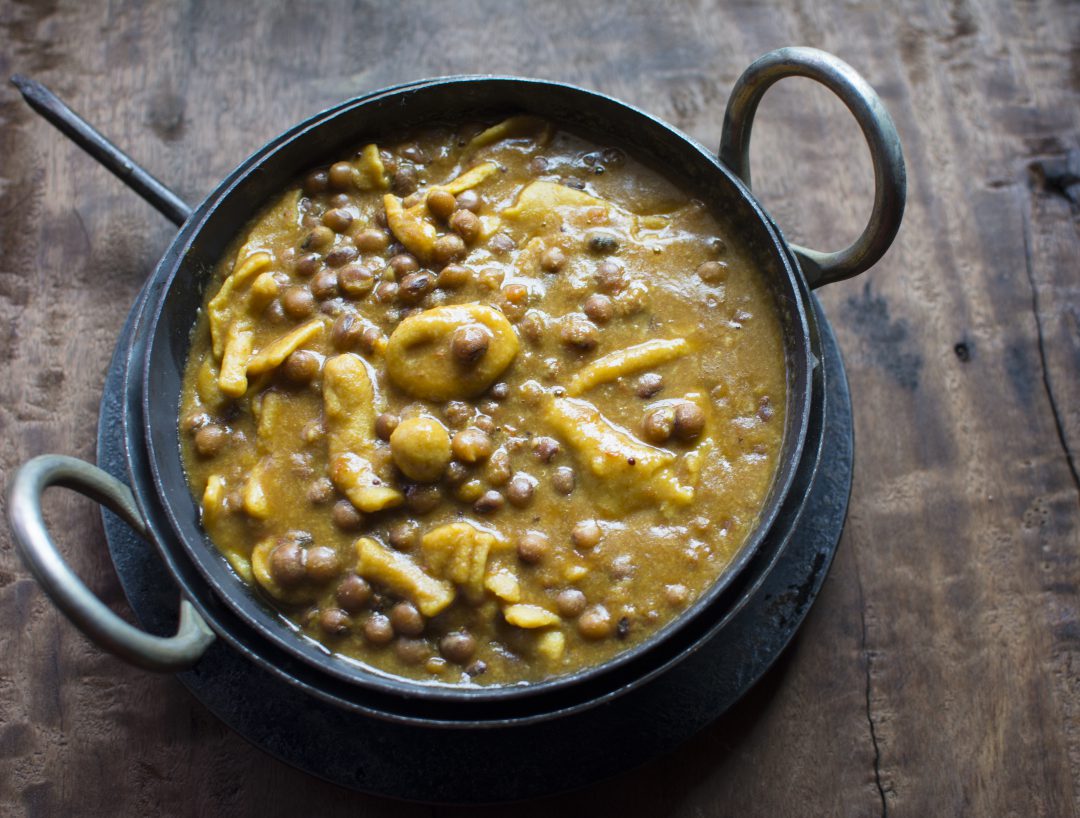
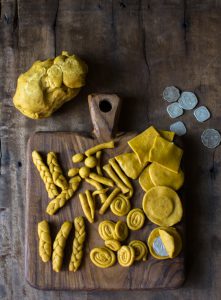
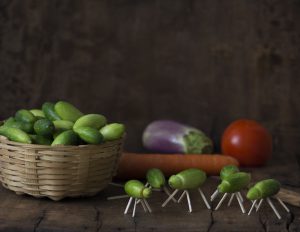
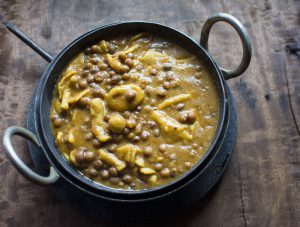

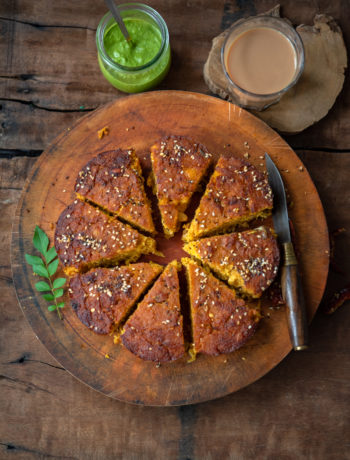
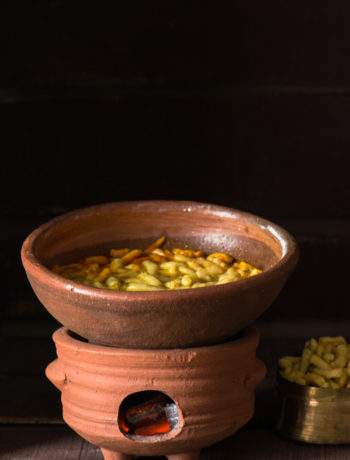
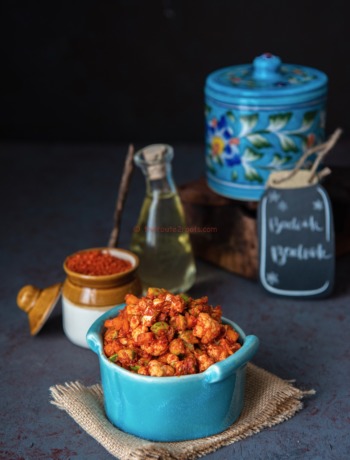
No Comments